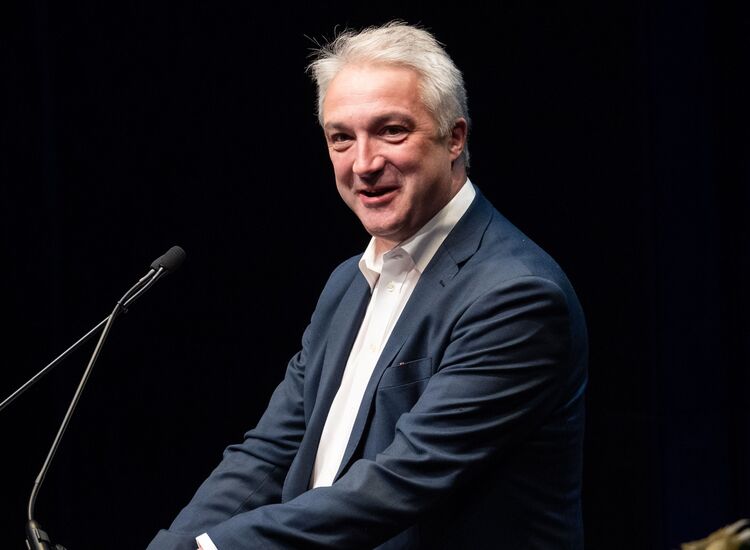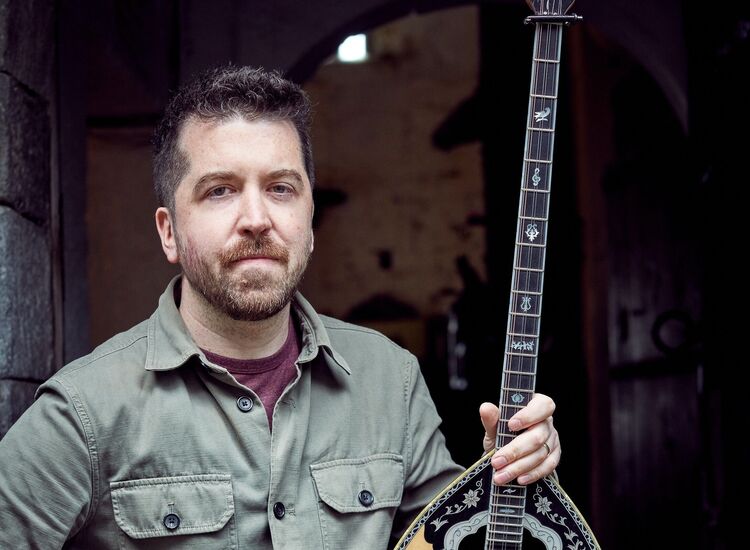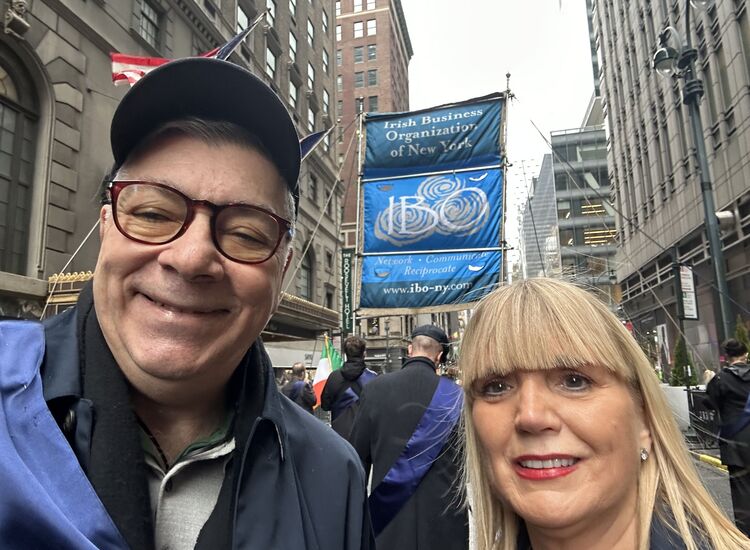[caption id="attachment_67633" align="aligncenter" width="600" caption="From left: Philip King, Glen Hansard, Martin Hayes, Gabriel Byrne, Iarla O'Lionard, Colum McCann."]
Rarely, if ever, have I witnessed a concert as bold, varied, beautiful, funny, poignant, and profane as "Other Voices New York City," sponsored by Imagine Ireland, the Irish-arts-in-America initiative under the aegis of Culture Ireland, whose visionary CEO is Eugene Downes. Ed Sullivan, stiff-limbed host of a very popular "really big shew" on network television back in the 1960s that ranged from a talking Italian mouse named Topo Gigio to singers Robert Goulet and Robert Merrill, would have understood but probably blanched at this three-and-a-half concert with no break.
"Other Voices New York City" took place on Oct. 27 and 28 inside Le Poisson Rouge (translation: The Red Fish), a club whose reputation for new, experimental, or otherwise edgy entertainment and sometimes demimonde daring is now well established at 158 Bleecker Street in Greenwich Village. At the Oct. 27 concert that I attended, most of the performances were spellbinding.
Providing a framework of continuity for the evening were Cork-born, Kerry resident musician and producer Philip King (of "Bringing It All Back Home" and, in Dingle, "Other Voices" music series fame), Glen Hansard (of the Frames and the movie "Once" fame), and Thomas Bartlett, a/k/a Doveman, who, along with his good friend Sam Amidon, has been making a stir in the musical ferment now bubbling from Brooklyn to downtown Manhattan.
Many years ago, Solas fiddler Winifred Horan tipped me off to a Vermont-based band called Popcon Behavior, whose members included Bartlett and Amidon, and I was impressed by their inventive, then trad-steeped sound. Both Bartlett (keyboards, vocals), who is also a fine piano accordionist, and Amidon (guitar, fiddle, banjo, vocals), whose 2001 CD, "Solo Fiddle," comprises 12 tracks of Irish tunes, are excellent players of Irish traditional music. Separately and collaboratively preoccupying the two musicians today, however, are composing and recording their own music.
On stage Bartlett and Clare-born fiddler Martin Hayes traded recollections of how they met. Hayes recalled a phone call from Bartlett about the possibility of setting up a concert for him in Vermont. When Hayes expressed interest, Bartlett said he'd have to ask permission from his mother. He was 12 years old at the time. And Bartlett recalled how he and his family essentially "stalked" Hayes around Ireland to catch as many concerts by the fiddler as they could during their visit.
Martin Hayes was in top form at Le Poisson Rouge. No doubt inspired by the array of other talent, he gave a mesmerizing performance of a long medley of Irish tunes, beginning slowly with "The Sailor's Bonnet," with each subsequent melody unfurling a little faster while Hayes confidently coaxed the audience into paying attention to the beauty of all the notes. Caoimhin O Raghallaigh, arguably Ireland's most risk-taking traditional fiddler, played a fairly straight melody line to set into relief Hayes's virtuosity, and Bartlett and Amidon accompanied. The generosity of O Raghallaigh in particular reinforced the concert's atmosphere of harmony--not just musical but interpersonal. Le Poisson Rouge seemed to levitate as Hayes, O Raghallaigh, Bartlett, and Amidon performed together.
Beauty was also abundant in "(Talk to Me of) Mendocino," a song composed by the late Kate McGarrigle, who died in January 2010 from cancer. Her daughter, Martha Wainwright (father is Loudon Wainwright III and brother is Rufus Wainwright), performed the song as a duet with Sam Amidon. It was heart-rending to hear the two delve into this tender song's journey, both geographic and spiritual, from New York State to the Midwest to the Mountain States and finally to California: "Talk to me of Mendocino / Closing my eyes, I hear the sea / Must I wait, must I follow? / Won't you say, 'Come with me'?"
Armagh-born poet and Princeton professor Paul Muldoon, who, as the poetry editor of the New Yorker magazine, has been bringing more Irish poets and their diverse verse to its pages, adroitly recited his poem "Bob Dylan at Princeton, November 2000." Then Glen Hansard took the stage with Philip King on harmonica and the de facto house band of the night--Bartlett, Amidon, Brad Albetta (Wainwright's husband) on bass, Doug Weiselman on sax, clarinet, and electric guitar (played bottleneck as well), and Ray Rizzo on drums--to deliver a scorching rendition of Dylan's "When I Paint My Masterpiece."
Another climactic musical moment came when Cork's Iarla O Lionaird, an unsurpassed sean-nos singer, transfixed the audience with a song in Irish backed by a full band.
Other literary highlights this night included Glen Hansard reciting a Seamus Heaney poem, co-emcee Gabriel Byrne describing with hilarious detail his days as a struggling actor in Dublin, Colum McCann expertly reciting a passage from James Joyce's "Ulysses" and then some of his own work, Joseph O'Connor reading from his writing, and Roddy Doyle regaling the crowd with comic, incisive insights from his work.
During the concert, Ireland's Glen Hansard never had less than a positive musical impact, supporting where needed, taking the reins where appropriate, and, in one strictly solo spot, singing a haunting new song on piano. Also from Ireland, The National's Aaron and Bryce Dessner, two members from Bell X1, and the Lost Brothers (keep an eye out for this talented duo) performed with distinction. Only Ireland's Jape, who I think partly relied on laptop programming for ambient background, fell below the night's high standard with a vacuous, recursive pop song called "Scorpio."
Unannounced guest performers included a vocalist named Trixie Whitley backing herself on a vintage Les Paul electric guitar as she sang one of her own songs with Bartlett adding piano accompaniment, and a duo of young women who sang their original material in fine twin harmony.
Damien Rice, whose recordings have sold in the millions, was also a surprise performer. Looking like a roadshow theater's casting idea of Robinson Crusoe, Rice sang with an acoustic guitar and without a vocal microphone an original song that was very compelling.
But the strongest impact by an unannounced guest performer came from Mx. Justin Vivian Bond (the "Mx." means "mix," referring to gender self-identity), who wore an evening gown and sang two songs of protest: "Talkin' 'Bout a Revolution," written by Tracy Chapman, and "Patriot's Heart," written by Mark Eitzel (of the band American Music Club). The concert was being filmed, and Mx. Bond asked if she/he could move around before launching into "Patriot's Heart." From his piano, Bartlett said, "You can move around," and Mx. Bond did. The song is about a male stripper, and the lines convey the angst of disenfranchisement: "He says give me all your money and don't tell me what you're thinking / I'm the past you wasted and the future you're obliterating."
Benefiting from the proceeds of "Other Voices New York City" is "Fighting Words," a creative-writing center and program co-founded by Roddy Doyle in Dublin in 2009. The goal of "Fighting Words" is to get Irish people of all ages, especially young students, to discover and develop their aptitude for writing. If they had attended this outstanding concert at NYC's Le Poisson Rouge, they would have heard how words work their unique magic with and without music.
What a night! Bravo, Culture Ireland!
"Poetry Fest 2011" at IAC
Speaking of verse, I recommend you check out "Poetry Fest 2011," taking place during Nov. 4-6 at the Irish Arts Center, 553 W. 51st St., New York, NY 10019. Featured poets include Nick Laird, Michael Longley, Dennis O'Driscoll, Leanne O'Sullivan, David Wheatley, and Sara Berkeley Tolchin. Call 866-811-4111 or visit www.irishartscenter.org.








